【新牛津译林版】初一英语学霸笔记
新牛津译林版七年级英语上册Unit1-8全册记忆知识点手册(学生版+解析版)
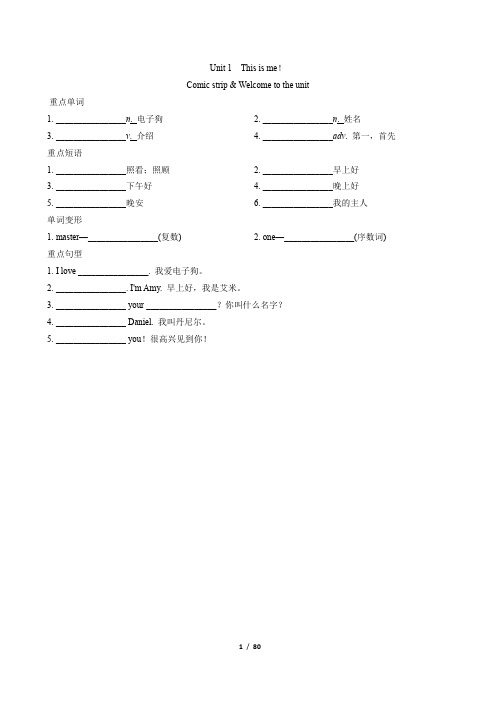
Unit 1This is me!Comic strip & Welcome to the unit重点单词1. ________________n. 电子狗2. ________________n. 姓名3. ________________v. 介绍4. ________________adv. 第一,首先重点短语1. ________________照看;照顾2. ________________早上好3. ________________下午好4. ________________晚上好5. ________________晚安6. ________________我的主人单词变形1. master—________________(复数)2. one—________________(序数词)重点句型1. I love ________________. 我爱电子狗。
2. ________________. I'm Amy. 早上好,我是艾米。
3. ________________ your ________________?你叫什么名字?4. ________________ Daniel. 我叫丹尼尔。
5. ________________ you!很高兴见到你!Reading重点单词1. ________________n. 同班同学2. ________________adj. 苗条的3. ________________ adj. 高的4. ________________ adj. 长的5. ________________ n. 音乐6. ________________ adj. 短的,个子矮的7. ________________ n. 数学单词变形1. classmate—________________(复数)2. tall—________________ (反义词)3. fat—________________(反义词)重点短语1. ________________ 短发2. ________________ 让某人做某事3. ________________ 放学后4. ________________ 踢足球5. ________________ 又高又瘦6. _____________________________ 擅长(做)某事7. ________________=________________ 来自8. ________________欢迎来到……9. ________________一个新学生10. ________________在阳光中学重点句型1. I'm 12 ________________. 我12岁了。
牛津译林版七年级上册英语Unit 1-Unit 4知识点总结

牛津译林版七年级上册英语Unit 1-Unit 4知识点总结Unit 1知识点总结一、单词短语1.love比like程度更深love doing/to do sth. loving doing多表示一贯的爱好,而love to do则多表示具体喜欢做的一件事。
enjoy doing sth (enjoy 译为喜欢,只能加doing)2.What's your name ? 回答:My name is .../ I’m....询问名字的方法还有:May I have your name ?/ Can you tell me your name ?3.master主人one’s master = the master of sb 某物或某人的主人Master(硕士)4.5.How to look after your e-dog.如何照顾你的电子狗。
疑问词+ 不定式(to do)如:I don’t know what to eat.look after=take care of照顾;照料I can look after myself.我能照顾我自己。
look after sb well = take good care of sb 照顾好某人look for 寻找look at 看。
look like 看起来像look out 小心(=Be careful! / Take care)look out of 朝...往外看look the same 看起来一样6.The new students in Class 1, Grade 7 at Sunshine Middle School are greeting each other.Class One Grade Seven 由小到大,都要大写用法相同的还有number ,lesson,unit,group,roomI’m in Grade 7.(对划线部分提问)What/ Which grade are you in?Our school has six grades.我们学校有6个年级。
七年级上册英语译林版笔记
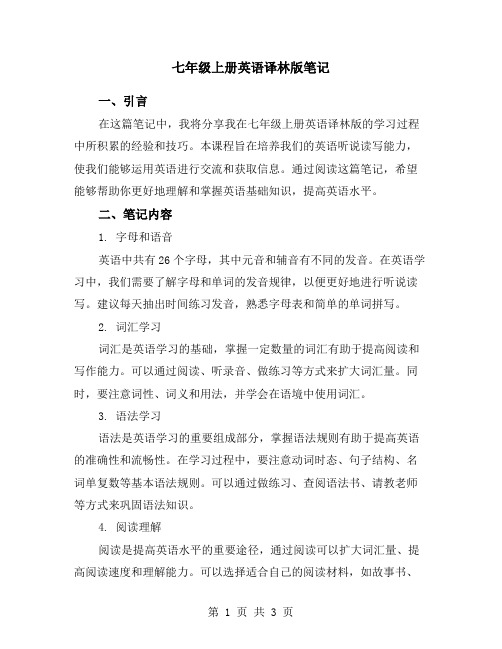
七年级上册英语译林版笔记一、引言在这篇笔记中,我将分享我在七年级上册英语译林版的学习过程中所积累的经验和技巧。
本课程旨在培养我们的英语听说读写能力,使我们能够运用英语进行交流和获取信息。
通过阅读这篇笔记,希望能够帮助你更好地理解和掌握英语基础知识,提高英语水平。
二、笔记内容1. 字母和语音英语中共有26个字母,其中元音和辅音有不同的发音。
在英语学习中,我们需要了解字母和单词的发音规律,以便更好地进行听说读写。
建议每天抽出时间练习发音,熟悉字母表和简单的单词拼写。
2. 词汇学习词汇是英语学习的基础,掌握一定数量的词汇有助于提高阅读和写作能力。
可以通过阅读、听录音、做练习等方式来扩大词汇量。
同时,要注意词性、词义和用法,并学会在语境中使用词汇。
3. 语法学习语法是英语学习的重要组成部分,掌握语法规则有助于提高英语的准确性和流畅性。
在学习过程中,要注意动词时态、句子结构、名词单复数等基本语法规则。
可以通过做练习、查阅语法书、请教老师等方式来巩固语法知识。
4. 阅读理解阅读是提高英语水平的重要途径,通过阅读可以扩大词汇量、提高阅读速度和理解能力。
可以选择适合自己的阅读材料,如故事书、报纸、杂志等。
在阅读过程中,要注意把握文章主旨、理解关键词汇、掌握行文逻辑等。
5. 听力训练听力是英语学习中不可或缺的一部分,通过听力训练可以增强英语语感和听力理解能力。
可以选择适合自己的听力材料,如英语广播、英语电影、英语歌曲等。
在听力训练中,要注意抓住关键词、理解语意、掌握语音语调等。
6. 口语表达口语表达是英语学习的重点之一,通过口语训练可以增强英语表达能力和交流能力。
可以与同学进行对话练习、参加英语角活动、与外国友人交流等方式来提高口语水平。
在口语训练中,要注意发音准确、表达清晰、使用地道的表达方式等。
7. 写作练习写作是英语学习的难点之一,通过写作练习可以增强英语书面表达能力和逻辑思维能力。
可以选择写短文、写摘要、写信等方式来练习写作。
译林牛津英语初一下册知识点归纳[1]
![译林牛津英语初一下册知识点归纳[1]](https://img.taocdn.com/s3/m/a4c1950ae009581b6ad9eb62.png)
译林牛津英语初一下册知识点归纳(word版可编辑修改)编辑整理:尊敬的读者朋友们:这里是精品文档编辑中心,本文档内容是由我和我的同事精心编辑整理后发布的,发布之前我们对文中内容进行仔细校对,但是难免会有疏漏的地方,但是任然希望(译林牛津英语初一下册知识点归纳(word版可编辑修改))的内容能够给您的工作和学习带来便利。
同时也真诚的希望收到您的建议和反馈,这将是我们进步的源泉,前进的动力。
本文可编辑可修改,如果觉得对您有帮助请收藏以便随时查阅,最后祝您生活愉快业绩进步,以下为译林牛津英语初一下册知识点归纳(word版可编辑修改)的全部内容。
译林牛津英语初一下册知识点归纳:Chapter One Travel一.课文重点词语与短语plan 计划 plan to do sth。
计划去做某事offer 提供 offer sb. sth。
= offer sth. to sb。
provide 提供 provide sth for sb = provide sb with sthshop 购物 shop for sth = buy sthWhy not do sth? =Why don’t you do sth 为什么不做…used to do sth 过去常常做某事be/get used to doing sth 习惯于做某事the same as…和…一样be famous for sth = be well—know for sth 以…闻名be famous as 作为…而著名help sb (to )do sth 帮助某人做某事help sb with sth 帮助某人做某事one of + 可数名词复数…之一,其中之一二.语法:冠词a,an,与the 的用法★不定冠词a/an的用法主要有:1.泛指表示“某一个”,用于可数名词单数前。
如: We need a rent to live in。
2.与可数名词单数连用,表示类别.如:1) I’m a student.(是学生而不是其他人。
牛津译林版英语七上:Unit4课堂笔记

初中英语学习材料madeofjingetieji一.课文重点Comic strip1.It’s lunchtime. 是吃午饭的时间了.= It’s time for lunch. = It’s time to have lunch.2.Let’s have a h amburger. 让我们吃一个汉包堡.概括: Let’s do sth 让我们做某事(Let’s后用动原)3.be always hungry总是饿(always等频度副词放在情动\Be动\助动之后,行为动词之前)4.need a lot of energy 需要许多能量否定: don’t need a lot of energy (此处的need 为行为动词)5. walk to my bowl many times a day 每天往我的碗走好多次画线提问用how often (多长时间一次),类似的还有:once a week (一周一次),twice a week (一周两次), three times a month (一月三次)6. a healthy person 一个健康的人区别:healthy 健康的(形) e.g. be healthy / keep healthy 保持健康a healthy diet 一个健康的日常饮食health 健康(名 ) e.g. be good for your health 对你的健康有好/益处be bad for your health 对你的健康有害Welcome to the unit1.What is your favourite food?你最喜爱的事物是什么?= What food do you like best? (favourite = like … best )2.What about …. ? …怎么样?What about doing sth ? 做某事怎么样? (about是介词,后跟动词要加ing)3.like sth / dislike sth /love/ hate sth 喜欢/不喜欢/爱/恨某物Like doing / dislike doing sth /love doing sth /hate doing sth喜欢/不喜欢/爱/恨做某事Reading1.want to be a dancer 想成为一名舞蹈家want to be …想成为…2. I dance for two hours every day.对划线提问用How long (多长时间)3.need lots of energy to dance 需要许多能量去跳舞概括: need sth to do …需用某物去做…扩展: need sb to do sth 需用某人做某事need to do sth 需用做某事4.get tired变得疲劳,变累5. I t’s very easy for me to get tired.对我来说很容易变累。
译林牛津中学初一上册的英语学习知识点学习归纳
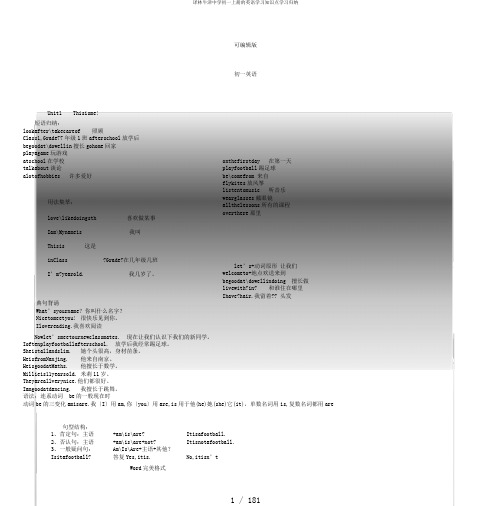
可编辑版初一英语Unit1 Thisisme!短语归纳:lookafter\takecareof 照顾Class1,Grade77年级1班afterschool放学后begoodat\dowellin擅长gohome回家playagame玩游戏atschool在学校talkabout谈论alotofhobbies 许多爱好用法集萃:love\likedoingsth喜欢做某事Iam\Mynameis我叫Thisis这是inClass?Grade?在几年级几班I’m?yearold.我几岁了。
典句背诵What’syourname?你叫什么名字?Nicetomeetyou! 很快乐见到你。
Ilovereading.我喜欢阅读onthefirstday 在第一天playfootball踢足球be\comefrom 来自flykites放风筝listentomusic 听音乐wearglasses戴眼镜allthelessons所有的课程overthere那里let’s+动词原形让我们welcometo+地点欢送来到begoodat\dowellindoing 擅长做livewith?in? 和谁住在哪里Ihave?hair.我留着?? 头发Nowlet’smeetournewclassmates.现在让我们认识下我们的新同学。
Ioftenplayfootballafterschool. 放学后我经常踢足球。
Sheistallandslim. 她个头很高,身材苗条。
HeisfromNanjing. 他来自南京。
HeisgoodatMaths. 他擅长于数学。
Millieis11yearsold. 米莉11岁。
Theyareallverynice.他们都很好。
Iamgoodatdancing. 我擅长于跳舞。
语法:连系动词be的一般现在时动词be的三变化amisare.我〔I〕用am,你〔you〕用are,is用于他(he)她(she)它(it),单数名词用is,复数名词都用are句型结构:1、肯定句:主语+am\is\are? Itisafootball.2、否认句:主语+am\is\are+not? Itisnotafootball.3、一般疑问句:Am\Is\Are+主语+其他?Isitafootball? 答复Yes,itis. No,itisn’tWord完美格式可编辑版4、特殊疑问句:疑问句+am/is/are+主语+其他?What’syourname?Unit2 Let'splaysports!短语归纳:playsports做运动manytimesaday一天许屡次playfootball/tennis踢足球/打网球talkabout谈论afterschool放学后goswimming去游泳amemberof?中的一员comefrom来自listentomusic听音乐inthenextWorldCup在下届世界杯cometrue实现inone’sfreetime在某人的空闲时间livein住/生活在readbooks看书at/onweekends=at/ontheweekend在周末stayathome待在家里alotof许多asksbaboutsth问某人某事onTV在电视上Watchbasketballmatches看篮球比赛feelgreat感觉特棒用法集萃:Whataboutdoingsth?做?怎么样?Enjoydoingsth喜欢做某事makesb/sth+adj使某人/某物makesbtodosth使某人做某事wanttodosth想要做某事hopetodosth希望做某事havefundoingsth做某事开心典句必背Ilikewalking.我喜欢散步。
Unit1-8重点笔记短语句型总结(默写版背诵版)牛津译林版英语七年级上册
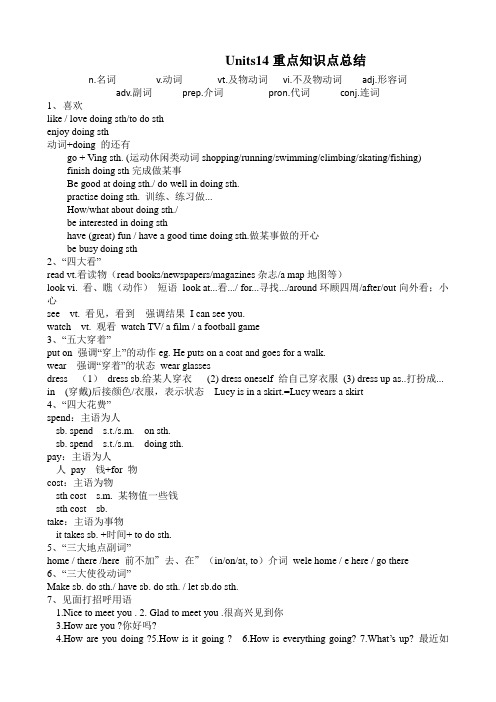
Units14重点知识点总结n.名词v.动词vt.及物动词vi.不及物动词adj.形容词adv.副词prep.介词pron.代词conj.连词1、喜欢like / love doing sth/to do sthenjoy doing sth动词+doing 的还有go + Ving sth. (运动休闲类动词shopping/running/swimming/climbing/skating/fishing)finish doing sth完成做某事Be good at doing sth./ do well in doing sth.practise doing sth. 训练、练习做...How/what about doing sth./be interested in doing sthhave (great) fun / have a good time doing sth.做某事做的开心be busy doing sth2、“四大看”read vt.看读物(read books/newspapers/magazines杂志/a map地图等)look vi. 看、瞧(动作)短语look at...看.../ for...寻找.../around环顾四周/after/out向外看;小心see vt. 看见,看到强调结果I can see you.watch vt. 观看watch TV/ a film / a football game3、“五大穿着”put on 强调“穿上”的动作eg. He puts on a coat and goes for a walk.wear 强调“穿着”的状态wear glassesdress (1)dress sb.给某人穿衣(2) dress oneself 给自己穿衣服(3) dress up as..打扮成... in (穿戴)后接颜色/衣服,表示状态Lucy is in a skirt.=Lucy wears a skirt4、“四大花费”spend:主语为人sb. spend s.t./s.m. on sth.sb. spend s.t./s.m. doing sth.pay:主语为人人pay 钱+for 物cost:主语为物sth cost s.m. 某物值一些钱sth cost sb.take:主语为事物it takes sb. +时间+ to do sth.5、“三大地点副词”home / there /here 前不加”去、在”(in/on/at, to)介词wele home / e here / go there6、“三大使役动词”Make sb. do sth./ have sb. do sth. / let sb.do sth.7、见面打招呼用语1.Nice to meet you .2. Glad to meet you .很高兴见到你3.How are you ?你好吗?4.How are you doing ?5.How is it going ?6.How is everything going?7.What’s up? 最近如何,你好吗?8、数字+year(s)+old “…岁”提问用“how old”数字yearold 表年龄,为形容词性短语“前有冠词后有名(词)”Eg. Helen is 11 years old = Helen is an 11yearold girl.9、Let’s 与let us 的区别Let’s do sth. 指包括听者(对方)和说者(我们)都在内,表示建议“让我们一起做...”Let us do sth.指“让(允许)我们做某事”而听者(对方)不做,只有“我们”做10、play+the+西洋乐器 e.g. play the pianoplay + 球类运动、棋牌类play football/volleyball ,play cards,play chess11、She es from Shanghai= She is from Shanghai . 注:如何提问Shanghai 及如何改一般疑问句Does she e from Shanghai?=Is she from Shanghai?12、be good at doing sth =do well in doing sthBe good at (反) be bad at do well in (反) be poor in13、介词over的用法(1)”在…正上方” There is a bridge over the river.(2)”越过” A plane flies over the house(3)”超过”There are over(=more than) 20 boys in this class.(4)”结束” be over Class is over! / Game is over.14、every one 与everyone 辨析区别(1)Every one 可以与of 连用,而everyone 却不能与of连用(复合不定代词不与of连用)Eg.every one of the children likes playing the puter games.(2) everyone 只指人=everybody而every one 既指人又可指物every one of the flowers花中的每一朵=each one of the flowers共同点:谓语动词,用“三单”15、family :“家庭”,作为整体,谓语动词用“单数”He has a big family.“家人”,强调成员,是复数含义,谓语动词用复数My family are at home.16、all/ both/ each/every/neither/ either 的用法all 三者或三者以上“全部、都”(1) all the 名词(all the afternoon = the whole afternoon;all the students)(2) all of +宾格/名词复数all of them/the students(3) all位置:be后,行前,或句首Both 两者都(1)both of +宾格/名词复数both of them/the students(2)both ... and .... ;both sides of the streetEach 指两个或两个以上“每一个”个体Each side of the streetEvery 指两个或两个以上“每一个”个体,也翻译成“全体,所有”,+n单,谓语动词也用单数Every student is here . 所有人都在。
2024版牛津译林英语七上笔记-Unit-1-This-is-me

第1页共4页Unit 1This is me!P61.other students 其他学生2.Class One Grade Seven 七年级一班【四个首字母都要大写】3.introduce ourselves 介绍我们自己4.how to greet others 如何问候其他人【疑问词+动词不定式to do 】5.make new friends wih sb 与···交新朋友6.our first day 我们的第一天7.at a new school 在一所新学校8.some of the students 同学中的一些=some students 一些同学P7A :1.greet sb 问候某人2.问候语good morning/good afternoon/good evening/good night 3.introduce each other 互相介绍4.my name is =my name’s=I’m 我的名字是····5.my English name 我的英文名字6.call me 叫我,call sb 叫某人、称呼某人7.Go by 叫做、被叫8.my Chinese name 我的中文名字B :1.what's your name?你的名字叫什么?2.Nice to meet you.见到你很高兴。
=Glad to meet/see you.回答:Nice to meet you too.3.Which class are you in?你在哪个班级?I'm in Class One.我在一班。
4.And you?你呢?=What about you/How about you?【what about/how about+Ving 】5.in the same class 在相同的班级6.have some hobbies 有一些爱好Do you have any hobbies?【some 用于肯定句any 用于否或疑问句】7.play the piano 弹钢琴【①play +the+西洋乐器②play+球类】8.like/love+Ving 喜欢做···C :1.other greetings 其他的问候2.think of 思考、考虑3.different greetings 不同的问候4.share sth with sb 与某人分享···第2页共4页1.introduce herself 介绍她自己2.反身代词人称单数复数常用词组第一人称myself 我自己ourselves 我们自己教自己自学teach oneself 享受自己玩得开心enjoy oneself伤害自己hurt oneself向某人作自我介绍introduce oneself to sb给自己穿衣服dress oneself 放松自己make oneself at home 靠自己by oneself 自便(用餐)help oneself第二人称yourself 你自己yourselves 你们自己第三人称himself 他自己herself 她自己itself 它自己themselves 他们自己3.before reading 在阅读之前【before /after 介词+Ving 】4.think about 思考5.tell sb about sth 告诉某人关于某事6.know about 了解7.new students 新同学8.a new student 一个新学生9.at Sunshine Middle School 在阳光中学10.twelve years old 12岁【对年龄提问how old 】Tom is eight years old=Tom is an eight-year-old boy.11.my new classmates 12.be friendly/nice/kind/good to 对···友好13.Let’s=let us 让我们+V 原【let sb do sth 让某人做某事】14.be full of energy 充满了能量【①be full of =be filled with 充满了②energy 名词能量(不可数)】15.be good at=do well in 擅长做···+名/Ving 16.【区分①be good for 对··有益②be good with=get on well with 和··相处的好、擅于应对③be good to sb 对···友好】17.play football 踢足球18.after school 放学后【区分after-school 形容词课后的after-school activities 课后活动】19.tall and slim 又高又瘦20.She has long hair.=Her hair is long 。
牛津译林版初中英语七年级下册知识点归纳
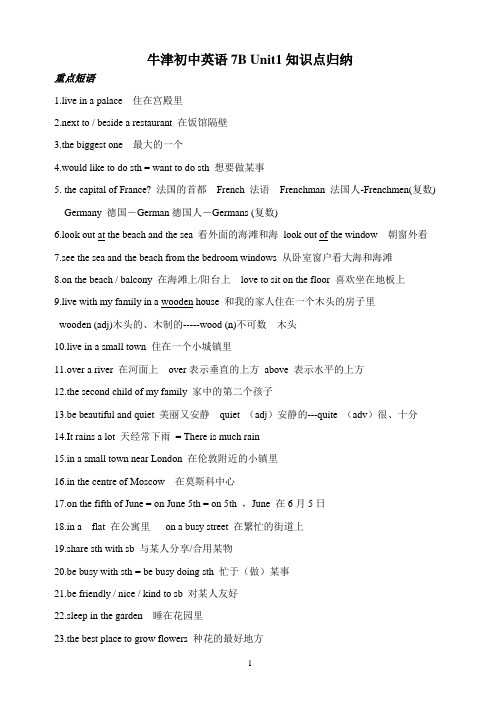
牛津初中英语7B Unit1知识点归纳重点短语1.live in a palace 住在宫殿里2.next to / beside a restaurant 在饭馆隔壁3.the biggest one 最大的一个4.would like to do sth = want to do sth 想要做某事5. the capital of France? 法国的首都French 法语Frenchman 法国人-Frenchmen(复数) Germany 德国-German德国人-Germans (复数)6.look out at the beach and the sea 看外面的海滩和海look out of the window 朝窗外看7.see the sea and the beach from the bedroom windows 从卧室窗户看大海和海滩8.on the beach / balcony 在海滩上/阳台上love to sit on the floor 喜欢坐在地板上9.live with my family in a wooden house 和我的家人住在一个木头的房子里wooden (adj)木头的、木制的-----wood (n)不可数木头10.live in a small town 住在一个小城镇里11.over a river 在河面上over表示垂直的上方above 表示水平的上方12.the second child of my family 家中的第二个孩子13.be beautiful and quiet 美丽又安静quiet (adj)安静的---quite (adv)很、十分14.It rains a lot 天经常下雨= There is much rain15.in a small town near London 在伦敦附近的小镇里16.in the centre of Moscow 在莫斯科中心17.on the fifth of June = on June 5th = on 5th ,June 在6月5日18.in a flat 在公寓里on a busy street 在繁忙的街道上19.share sth with sb 与某人分享/合用某物20.be busy with sth = be busy doing sth 忙于(做)某事21.be friendly / nice / kind to sb 对某人友好22.sleep in the garden 睡在花园里23.the best place to grow flowers 种花的最好地方24.cook meals = make dinner = do some cooking 做/ 烧饭25.in most homes 在大多数家庭tell sb about sth 告诉某人有关某事26.on the ninth floor 在第9层( On which floor does he live? )27.chat with friends on the balcony 和朋友在阳台上聊天28.on a quiet street 在一条安静的街道上29.sit between you and me 坐在我和你之间on / over the phone = by phone 通过电话30.two hundred students 200名学生hundreds of students 数百名学生Two hundred of the students are from America 学生中有200名来自美国31.arrive on Sunday 在星期天到达( arrive at / on; reach; get to)32.can't wait to do sth 迫不及待的做某事(can't help doing 情不自禁做某事)33.have a free day 休息/休假一天( have three days off 放三天假)34.be tired after the long plane journey from London to Beijing (tired不要误写成tried)从伦敦到北京的长途飞机旅行后劳累了35.Don't worry 别担心worry about sb/sth 为……而担心be worried about... (形容词)36.sound great /good 听起来很棒(sound, feel, look, taste等为连系动词,后接形容词)e first = win the first prize (in an English exam)得第一名38.make a video of 拍……的录像watch the video 看录像39.be different from …… 与……不同be the same as …… 与……相同There are many differences between the USA and the UK (difference 可数名词区别)=The USA is different from the UK (different adj 不同的)40.your own bedroom 你自己的卧室owner (n)主人own (adj)自己的41.call sb (up)打电话给某人call sb back 给某人回电话answer the telephone接电话42.homes in different countries 不同国家的家be free = have time 有空43. take a message for sb 为某人捎个可信44.at least 至少at most 至多at last 最后,终于at the same time 同时45.fifty metres long 50米长an 800-metre-long river46.have a room with twelve showers and four baths 有一间有12个淋浴器和4个浴缸的房间47.have / take a shower 淋浴have/take a bath 洗澡48.on the bedside table 在床头柜上coffee table 矮茶几49.live two floors above / below sb 住在某人上面/下面两层50.the Great Wall 长城the Summer Palace 颐和园51.the Space Museum 太空博物馆the Palace Museum 故宫重点句子1.Would you like to live in a palace ? 你想住在宫殿里吗?2.The capital of France is Paris 法国的首都是巴黎3.My favourite place is the balcony 我最喜欢的地方是阳台4.We love to sit on the floor and look out at the beach and sea我们喜欢坐在地板上看外面的海滩和大海5.My house is over a river 我家房子在河上There is a bridge over the river 河上有座桥6.I climb a ladder to get into my house 我爬梯子进入我的房间=I get into my house with a ladder = I use a ladder to get into my house7.I am the second child of my family 我是家中第二个孩子8.My family and I often sit in the kitchen while my mother makes dinner当妈妈做饭时,我和家人坐在厨房里9.I have a dog .Its birthday is on the fifth of June 我有一只狗它的生日在6月5日10.I live with my family in a flat on a busy street 我和家人一起住在一条繁忙街道的一间公寓里=My family and I live in a flat on a busy street11.I share a bedroom with my sister 我和姐姐共享一个卧室=My sister and I share a bedroom = My sister and I live in the same bedroom12.Our neighbours are friendly /kind / nice to us 我们的邻居对我们很友好13.The garden is the best place to grow flowers 花园是种花的最好地方14.In most homes , people cook meals in the kitchen 在大部分家庭,人们在厨房烧饭15.The window is opposite the door 窗户在门的对过16.I am arriving in Shanghai on Sunday 我将在周六到达上海=I will arrive in Shanghai on Sunday = I will get to Shanghai on Sunday=I will reach Shanghai on Sundayarrive in + 大地点arrive at + 小地点当后接地点副词here,there ,home时要省略介词get home 到家(也要省略介词to) 当后无到达地点时,只用arrive 而不用reach或get When will they arrive tomorrow ? 他们明天什么时候到达?17.I can't wait to visit the Space Museum 我迫不及待参观太空博物馆18.I think you would be tired after the long plane journey from London to Beijing我认为你从伦敦到北京的长途飞机旅行后应该劳累了19.I 'd like to take you to the Great Wall on Tuesday , the nineteenth of February我想在2月19日星期二,带你去长城20.Your house is really different from the flats in Beijing 你的房子真的不同于北京公寓21.I would like my own bedroom 我想有一间我自己的卧室22.I 'll call you when I am free 当我有空时,我将打电话给你23.What kind of home do you live in ? 你住在什么样的家里?24.There are no other rooms on the second floor 三楼没有其他的房间了other 和some,any,many,no等限定词连用时,常放在它们的后面Ask some other students 问问别的同学们吧25.Many friends can stay with me at the same time 许多朋友可以和我同时呆在一起26.I have a room with (= which has )twelve showers and four baths我有一间有12个淋浴器和4个浴缸的房间27.May I speak to Daniel,please ? 我可以和Daniel通话吗?This is Daniel (speaking),.Who's calling,please? 我就是,你是谁?This is Simon 我是Simon28.It's + adj + (for sb) + to do sth 做某事对某人来说是……的It's nice to sit in it and watch TV 坐在里面看电视是很好的29.It's my first time to come to Beijing 这是我第一次来北京序数词前一般要用定冠词,但是当序数词前有my,his her等形容词性物主代词或this,that 等指示代词,则不用再加the.牛津初中英语7BUnit2知识点归纳重点短语及句子1.one tin /can dog food 一听狗食How many tins of dog food can we buy with one yuan ?None我们用一元钱可以买多少听狗食?一个没有2.go to the supermarket 去超市3.how much money do we have ? 我们有多少钱4.对how many / how much……?回答时用none对what 's ……?回答时用nothing对who 's ……?回答时用nobody /no one5.order a pizza 点一个比萨饼6.maybe (adv)或许、大概=perhaps 要放于句首Maybe you are rightmay be 也许作复合谓语要放于句中=You may be right Maybe we can order a pizza = We may order a pizza7.a group of exchange students 一群交流学生8.love watching /seeing films 喜欢看电影9.take sb to s.p 带某人去某地10.sports centre 体育中心11.lots of different Chinese restaurants 许多不同的中餐店12.go to the cinema =see /watch a film 去电影院/看电影13.prepare for 为……做准备14.a great new town 一座崭新的城15.There are lots of things to do in Sunshine Town 在阳光城有许多事情要做16.tell sb about sth 告诉某人有关……We want to tell you about life in this great new town 我们想告诉你有关这座城市的生活17.live in a modern town 住在现代化的城里18.by underground 乘地铁It’s only 40 minutes from the centre of Beijing by undergro und从北京市中心乘地铁只需40分钟19.less……than…… 比……更少less air pollution 更少的空气污染more……than…… 比……更多fewer ... than 比……更少(修饰可数名词复数)There is les air pollution in Sunshine Town than in other areas阳光城的空气污染比北京的其他地区的污染少20.go walking = go for a walk 去散步21.a country park 一个乡村公园22.most of us /them / you 我们/他们你们/中的大多数most of the students 大多数学生23.be close to 靠近、离……很近stand close to me 站靠近我my close friend 亲密的朋友24.none of us 我们中一个也不( neither of us 我们两个都不,后用三单)25.for example 例如26.live in the same building 住在相同的大楼27.don’t have to do = needn't do 不必做某事You do not have to go far 你不必走太远28.need help with…… 在……方面需要帮助far away from 离……遥远need sth 需要…… need to do sth 需要做某事How far 多远They do not have to go far if they need help with their homework如果他们在家庭作业方面需要帮助,他们不必走太远29.You can shop until ten o'clock at night in most shopping malls在大多数购物中心你可以到晚上10点( until 直到)I won't go to bed until he comes back 直到他回来我才会睡觉(not …until 直到……才)30.If so,you are here in the right place 如果是这样,你就来对了地方31.It’s hard to say 很难说32.You can choose any food you like in Sunshine Town在阳光城你可选择任何你喜欢的食物33.You can try Beijing Duck in one of the Chinese restaurants 在其中一家中式餐馆你可以尝一尝北京烤鸭any food you like 任何你喜欢的食物one of the Chinese restaurants其中一家中式餐馆34.lots of Western restaurants 许多西餐馆35.(enjoy)Beijing Opera (欣赏)京剧36.Why don't you visit our local theatre with us ?=Why not visit our local theatre with us ?local theatre 当地的剧院at the theatre 在剧院Why don't you do sth ? = Why not do sth ? 为什么不干某事呢?37.never mind 没关系/不要紧It doesn't matter 没关系,不用谢38.a great / wonderful place to live 一个居住的好地方39.one bag of each 每样一包three kilos of each 每样3公斤40.ten loaves of bread 十块面包one kilo and a half apples= one and a half kilos of apples.41. belong to sb/ me /Millie 属于某人的The book belongs to me = The book is mine42.be dirty 脏的43.be ill /sick in hospital 生病住院 a sick mother 一个生病的母亲44.What else = What other things 其他的还有什么东西? What else do we need ?Something else 别的东西somebody else 别人somebody else’s 别的什么人的45.all over the place 到处都是all over 遍及\到处all over the world46.hold / have a party举行聚会There will ___ (举行)a party tomorrow.47.want to become good friends想要成为好朋友make friends with sb和某人交朋友48.Don't miss the great show 不要错过这次盛大的展览49.golden throne 黄金御座works of art 艺术品Chinese paintings 中国画introduction to the Palace Museum 对于故宫的介绍50.There are lots of fun and interesting things to see 有许多有趣的东西可看51.see fine works of art 看好的艺术品52.enjoy a full day 享受一整天53.not much pollution 没有很多污染54.at the youth centre 在青年活动中心55.ride a bike(bicycle) /by bike / on one 's /the bike 骑自行车I like going into town on my bicycle/by bike 我喜欢骑车进城56.show sb around s.p. 带某人参观某地I am going to show you around my home town 我将带你参观我的家乡57.What time shall we leave in the morning ? 我们早上什么时候出发?leave for 离开去某地She’s leaving for Shanghai tomorrow morning.leave 遗留,落(丢)下I left my watch at home.我把手表丢(忘)家里了。
【新牛津译林版】初一英语学霸笔记
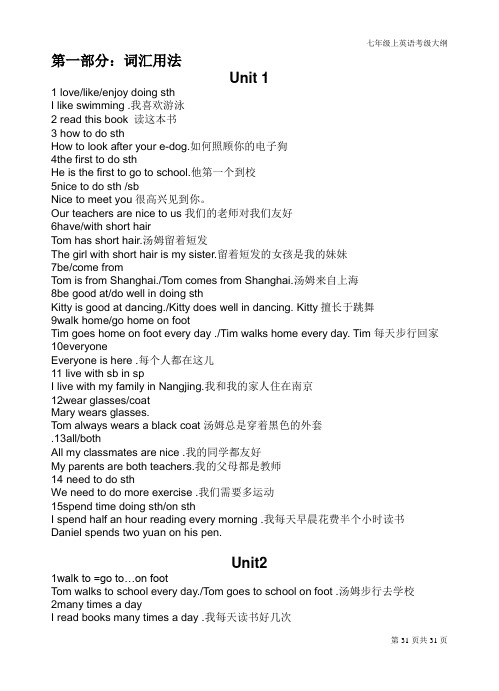
第一部分:词汇用法Unit 11 love/like/enjoy doing sthI like swimming .我喜欢游泳2 read this book 读这本书3 how to do sthHow to look after your e-dog.如何照顾你的电子狗4the first to do sthHe is the first to go to school.他第一个到校5nice to do sth /sbNice to meet you很高兴见到你。
Our teachers are nice to us我们的老师对我们友好6have/with short hairTom has short hair.汤姆留着短发The girl with short hair is my sister.留着短发的女孩是我的妹妹7be/come fromTom is from Shanghai./Tom comes from Shanghai.汤姆来自上海8be good at/do well in doing sthKitty is good at dancing./Kitty does well in dancing. Kitty擅长于跳舞9walk home/go home on footTim goes home on foot every day ./Tim walks home every day. Tim每天步行回家10everyoneEveryone is here .每个人都在这儿11 live with sb in spI live with my family in Nangjing.我和我的家人住在南京12wear glasses/coatMary wears glasses.Tom always wears a black coat汤姆总是穿着黑色的外套.13all/bothAll my classmates are nice .我的同学都友好My parents are both teachers.我的父母都是教师14 need to do sthWe need to do more exercise .我们需要多运动15spend time doing sth/on sthI spend half an hour reading every morning .我每天早晨花费半个小时读书Daniel spends two yuan on his pen.Unit21walk to =go to…on footTom walks to school every day./Tom goes to school on foot .汤姆步行去学校2many times a dayI read books many times a day .我每天读书好几次3sport/sportsWhat is your favourite sport?你最喜欢的运动是什么?Let`s play sports .我们一起运动吧4every day/every weekI go swimming every week.我每周去游泳5what/how aboutWhat about going swimming?去游泳怎么样?6like…very muchI like playing football very much.我非常喜欢踢足球7favourite=like…bestMy favourite volleyball player is Tom ./I like Tom best.汤姆是我最喜欢的足球运动员8look +adjKitty looks slim Kitty看上去苗条9play…very wellWe play badminton very well.我们打羽毛球非常好10 in his free timeIn his free time,he studies English.在他的业余时间,他学习英语11make sb do +adj/do sthIt makes him happy.它是他开心It makes me feel great.它使我感觉很棒12want to do sthLi Hua wants to play in the next world Cup.李华想踢进下一届世界杯13come trueI hope his dream comes true.我希望他的梦想变为现实14at / on the weekend/on/at weekendsMy mum often goes shopping at weekends我的妈妈经常在周末购物15shop/go shoppingI want to shop/go shopping this weekend.我想这个周末去购物16Reading is fun.Smoking is bad for you .吸烟对你有害17talk aboutWe often talk about playing basketball matches .我们经常谈论篮球比赛18 heroesThey are all my heroes. 他们都是我的偶像。
牛津译林版英语七上:Unit1课堂笔记
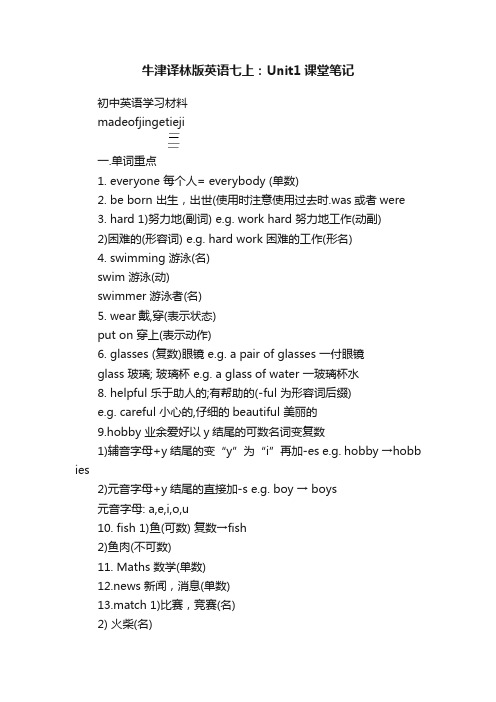
牛津译林版英语七上:Unit1课堂笔记初中英语学习材料madeofjingetieji一.单词重点1. everyone 每个人= everybody (单数)2. be born 出生,出世(使用时注意使用过去时.was或者were3. hard 1)努力地(副词) e.g. work hard 努力地工作(动副)2)困难的(形容词) e.g. hard work 困难的工作(形名)4. swimming 游泳(名)swim 游泳(动)swimmer 游泳者(名)5. wear戴,穿(表示状态)put on 穿上(表示动作)6. glasses (复数)眼镜 e.g. a pair of glasses 一付眼镜glass 玻璃; 玻璃杯 e.g. a glass of water 一玻璃杯水8. helpful 乐于助人的;有帮助的(-ful 为形容词后缀)e.g. careful 小心的,仔细的beautiful 美丽的9.hobby 业余爱好以y结尾的可数名词变复数1)辅音字母+y结尾的变“y”为“i”再加-es e.g. hobby →hobb ies2)元音字母+y结尾的直接加-s e.g. boy → boys元音字母: a,e,i,o,u10. fish 1)鱼(可数) 复数→fish2)鱼肉(不可数)11. Maths 数学(单数)12.news 新闻,消息(单数)13.match 1)比赛,竞赛(名)2) 火柴(名)3)相配(动)14.well 1) 好(副) e.g. swim well 游得好do well 做得好(动副)2) 身体好的 e.g. I am well . 我身体很好( 系表)15.borrow 向(别人)借用 e.g. borrow sth from sb 向某人借某物16. lots of = a lot of 许多(后可跟可数或不可数)17. someone某人= somebody (单数)二.课文重点Comic strip1.how to look after your e-dog 如何照顾你的电子狗概括:1.how to do sth 如何做某事2.look after sb 照顾某人.look after sb well 照顾好某人Welcome to the unit1.Good evening !晚上好(见面时的问候语)Good night! 晚安(分开时的道别语)Reading1.in Class 1,Grade 7 在七年级1班2.I was born in … 我出生在…(某城市或国家)3.love playing football 喜爱踢足球概括: love doing sth 喜爱做某事4.after school 放学后扩展: after class 下课后after lunch 午饭后e from Beijing 来自北京= be from Beijing6.tall and slim 高且苗条7.have long black hair长着长长的黑头发8.like listening to music 喜欢听音乐9.work hard 努力地学习;努力地学习( 动词+副词)work 工作(动词) hard 努力地(副词)hard work 困难的工作( 形容词+名词)hard 困难的(形容词) work 工作(名词)10.be good at swimming 擅长游泳概括:be good at doing sth 擅长做某事(at ,介词,后跟动词,动词要加ing) 扩展:be good at sth 擅长某事 e.g. be good at English 擅长英语11.wear glasses 戴眼镜12.enjoy playing computer games 喜欢打电脑游戏概括: enjoy doing sth 喜欢做某事扩展: enjoy sth 喜欢某事.欣赏某事 e.g. enjoy Beijing opera欣赏京剧enjoy oneself 过得快乐,玩得开心 e.g. enjoy myself 我玩得开心13.polite and helpful 礼貌且乐于助人Vocabulary1.play football on the football field 在足球场上踢足球play badminton on the badminton court 在羽毛球场上打羽毛球Grammar1.our Maths teacher 我们的数学老师2.have breakfast 吃早饭= eat breakfast3.at lunchtime 在午餐时间4.take my dog for a walk 带我的狗散步= walk my dog5.walk home = go home on foot 步行回家walk to school = go to school on foot步行去上学6.take the bus 乘公交车7.at the weekend 在周末8.go running for half an hour 去跑步半小时对划线提问用How long9.at my grandparents’home 在我祖父母的家里Integrated skills1.score for…为…得分2.a good football player 一个好的足球运动员= be good at playing football3.like reading books about football 喜欢读关于足球的书4.play for… 为…效力5.the newest member 最新的成员(形容词最高级前+ the)6.score goals 得分7.the next World Cup下一届世界杯8.look happy 看起来开心9.our school football team 我们学校足球队10.play very well 打(踢)得非常好11.my favourite football player我最喜爱的足球队员Study skills1.How do you say that in English? 如何用英语说它Main task1.dark brown eyes 深棕色的眼睛2.listen to CDs 听CD3.lots of friends 许多朋友= a lot of friends4.live with my family 和我家人一起生活5.all my lessons 我所有的课Checkout1.know sb well 熟悉某人2.many of you 你们中的许多人3.sound great 听起来好极了三.语法重点1.一般现在时+ am / is / are + ...总结句型:主语) + + 动词原形+ ...(不是三单)+ 动词(e)s / has +...(三单)2).be动词的选择: is, am, are与主语的连用,我(I)是am,你(you)是are,单数is,复数are,is用在他,她,它(he/ she/ it).3.行为动词的第三人称单数变化规则。
译林版英语七年级上册笔记
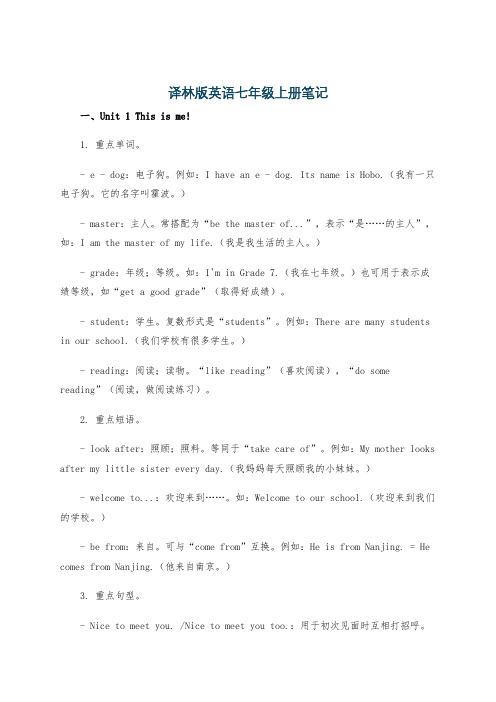
译林版英语七年级上册笔记一、Unit 1 This is me!1. 重点单词。
- e - dog:电子狗。
例如:I have an e - dog. Its name is Hobo.(我有一只电子狗。
它的名字叫霍波。
)- master:主人。
常搭配为“be the master of...”,表示“是……的主人”,如:I am the master of my life.(我是我生活的主人。
)- grade:年级;等级。
如:I'm in Grade 7.(我在七年级。
)也可用于表示成绩等级,如“get a good grade”(取得好成绩)。
- student:学生。
复数形式是“students”。
例如:There are many students in our school.(我们学校有很多学生。
)- reading:阅读;读物。
“like reading”(喜欢阅读),“do some reading”(阅读,做阅读练习)。
2. 重点短语。
- look after:照顾;照料。
等同于“take care of”。
例如:My mother looks after my little sister every day.(我妈妈每天照顾我的小妹妹。
)- welcome to...:欢迎来到……。
如:Welcome to our school.(欢迎来到我们的学校。
)- be from:来自。
可与“come from”互换。
例如:He is from Nanjing. = He comes from Nanjing.(他来自南京。
)3. 重点句型。
- Nice to meet you. /Nice to meet you too.:用于初次见面时互相打招呼。
- I love reading. / I like playing football.:表达爱好的句型,“love/like + doing sth.”表示喜欢做某事。
七年级上册译林版英语书笔记

七年级上册译林版英语书笔记一、单词。
1. 重点单词。
- this:这个,是指示代词,用于指代离说话者较近的人或物。
例如:This is my book.(这是我的书。
)- that:那个,也是指示代词,用于指代离说话者较远的人或物。
例如:That is his pen.(那是他的笔。
)- I:我,是主格形式,在句子中作主语。
例如:I am a student.(我是一名学生。
)- you:你,你们,既可以作主格也可以作宾格。
作主语时,如You are my friend.(你是我的朋友。
)作宾语时,如I like you.(我喜欢你。
)- he:他,主格形式。
例如:He is a good boy.(他是一个好男孩。
)- she:她,主格形式。
例如:She is my sister.(她是我的妹妹。
)- it:它,主格和宾格同形。
可以指代动物、植物或无生命的物体等。
例如:It is a cat.(它是一只猫。
)- name:名字,名词。
例如:What's your name?(你叫什么名字?)- to:到,向,是介词。
例如:Welcome to our school.(欢迎来到我们的学校。
)- meet:遇见,相逢,动词。
例如:Nice to meet you.(很高兴见到你。
)- too:也,还,副词。
例如:I like English, too.(我也喜欢英语。
)- your:你的,你们的,形容词性物主代词。
例如:Your book is very interesting.(你的书很有趣。
)- his:他的,形容词性物主代词。
例如:His name is Tom.(他的名字是汤姆。
)- her:她的,形容词性物主代词。
例如:Her hair is long.(她的头发很长。
)2. 词汇拓展。
- classmate:同学,由class(班级)+mate(伙伴)组成。
- teacher:教师,动词teach(教)的名词形式,以 -er结尾表示从事某种职业的人。
牛津译林版七年级英语上册Unit 1 重点知识点归纳
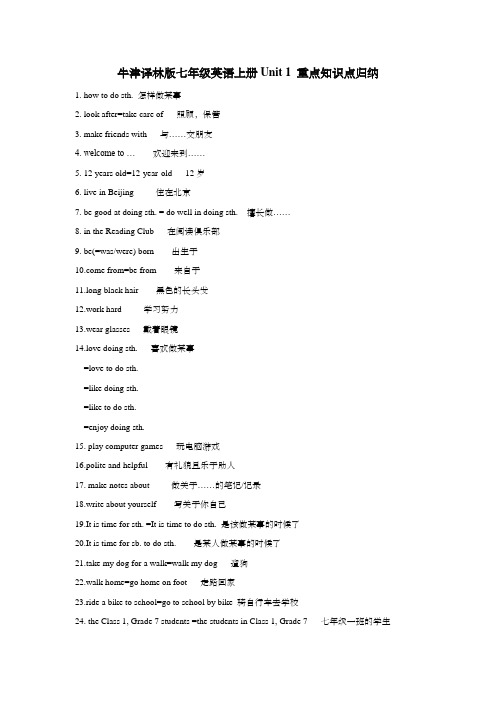
牛津译林版七年级英语上册Unit 1 重点知识点归纳1. how to do sth. 怎样做某事2. look after=take care of 照顾,保管3. make friends with 与……交朋友4. welcome to … 欢迎来到……5. 12 years old=12-year-old 12岁6. live in Beijing 住在北京7. be good at doing sth. = do well in doing sth. 擅长做……8. in the Reading Club 在阅读俱乐部9. be(=was/were) born 出生于e from=be from 来自于11.long black hair 黑色的长头发12.work hard 学习努力13.wear glasses 戴着眼镜14.love doing sth. 喜欢做某事=love to do sth.=like doing sth.=like to do sth.=enjoy doing sth.15. play computer games 玩电脑游戏16.polite and helpful 有礼貌且乐于助人17. make notes about 做关于……的笔记/记录18.write about yourself 写关于你自己19.It is time for sth. =It is time to do sth. 是该做某事的时候了20.It is time for sb. to do sth. 是某人做某事的时候了21.take my dog for a walk=walk my dog 遛狗22.walk home=go home on foot 走路回家23.ride a bike to school=go to school by bike 骑自行车去学校24. the Class 1, Grade 7 students =the students in Class 1, Grade 7 七年级一班的学生25. help sb. do sth.=help sb. with sth. 帮助某人做某事26. badminton court 羽毛球场27. football field 足球场28.swimming pool 游泳池29. write to sb. 写信给某人30.go running 去跑步31.watch football match 观看足球比赛32.at my grandparents’ home 在我祖父母家33.at the weekend=at weekends 在周末34.fly a kite with sb. 和某人一起放风筝35.a piece of Sports News 一则体育新闻36.play for… 为……效力37.the newest member 最新的成员38.score goals 进球得分39.the next World Cup 下一届世界杯40. one’s favourite football player 某人最喜欢的足球运动员41. look strong (nice, happy...)看起来很强壮(漂亮,高兴……)42.play very well in the match 在比赛中表现得很好43.in the school football team 在学校足球队44.win the match 赢了比赛45. borrow sth. from sb. 向某人借某物46.lend sth. to sb. 把某物借给某人47.say sth. in English 用英语说某物48.the answer to sth. 某物的答案49.begin/start to do sth. 开始做某事50.dark brown eyes 深褐色的眼睛51.live with sb. in spl. 和某人一起住在某地52.lots of = a lot of 许多53.It sounds great! 听起来真棒!7A Unit 1 语法——一般现在时一、定义与讲解一般现在时:表示经常性的事情,经常性的动作或一般性事实。
初一英语笔记上册译林版
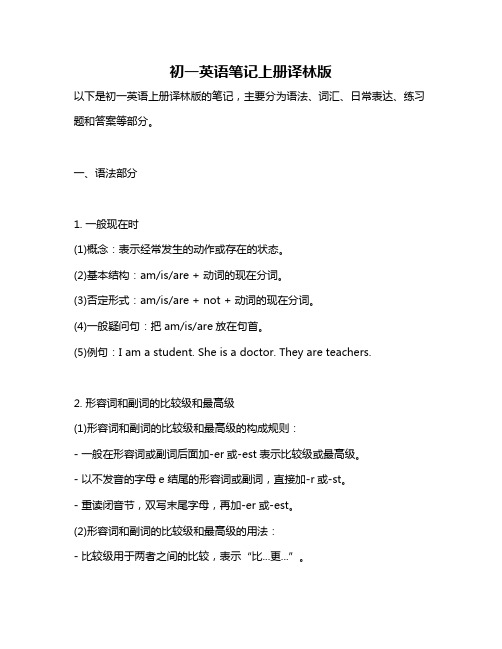
初一英语笔记上册译林版以下是初一英语上册译林版的笔记,主要分为语法、词汇、日常表达、练习题和答案等部分。
一、语法部分1. 一般现在时(1)概念:表示经常发生的动作或存在的状态。
(2)基本结构:am/is/are + 动词的现在分词。
(3)否定形式:am/is/are + not + 动词的现在分词。
(4)一般疑问句:把am/is/are放在句首。
(5)例句:I am a student. She is a doctor. They are teachers.2. 形容词和副词的比较级和最高级(1)形容词和副词的比较级和最高级的构成规则:- 一般在形容词或副词后面加-er或-est表示比较级或最高级。
- 以不发音的字母e结尾的形容词或副词,直接加-r或-st。
- 重读闭音节,双写末尾字母,再加-er或-est。
(2)形容词和副词的比较级和最高级的用法:- 比较级用于两者之间的比较,表示“比...更...”。
- 最高级用于三者或三者以上的比较,表示“最...”。
- 表示比较级的常用句型:主语+谓语+比较级+than+宾语。
- 表示最高级的常用句型:主语+谓语+the+最高级+of/among+宾语。
(3)例句:She is taller than me. This book is the most interesting of the three.二、词汇部分1. 表示家庭成员的词汇:- 父亲:father- 母亲:mother- 哥哥:older brother- 姐姐:older sister- 弟弟:younger brother- 妹妹:younger sister2. 表示职业的词汇:- 教师:teacher- 医生:doctor- 警察:policeman (policewoman)- 护士:nurse3. 表示性格特征的形容词:- 聪明的:clever- 友好的:friendly- 有趣的:funny- 慷慨的:generous4. 表示感觉和情绪的词汇:- 高兴的:happy- 生气的:angry- 伤心的:sad- 惊讶的:surprised。
2024版牛津译林英语七上笔记Unit 2 Hobbies

Unit2HobbiesP181.bring joys to our life把快乐带给我们的生活【bring带来①bring sth tosb把某物带给某人(to方向性)②bring sth for sb为某人带来某物(for 服务性)】2.some students’hobbies一些学生的爱好3.after-school clubs课外的俱乐部【区分after-school形容词课外的after school放学后】4.think about思考、考虑【区分①think about思考的对象为事物,更深层次和持续时间更长的思考过程②think of思考的对象既可以为人也可以为物,通常表示一种短暂、即时的、突发性的或瞬间的的思考】5.be important for us对我们来说很重要【①It is important for sb to do sth对某人来说做某事很重要②important形容词重要的importance 名词重要性the importance of···的重要性】☆①It’s+adj+to do sth做某事是···的。
It's exciting to travel to new places.去新地方旅行是令人兴奋的。
②It's+adj+of sb+to do sth:of前的形容词用来形容人物的性格。
某人做某事是···的。
It is so nice of him to help the old people.他很善意去帮助那些老人。
③It's+adj+for sb+to do sth.:for前的形容词用来描述do后面的事物的。
某人做某事是···的。
It is difficult for him to do his homework.对他来说做他自己的作业是很难的。
初一英语上册笔记译林
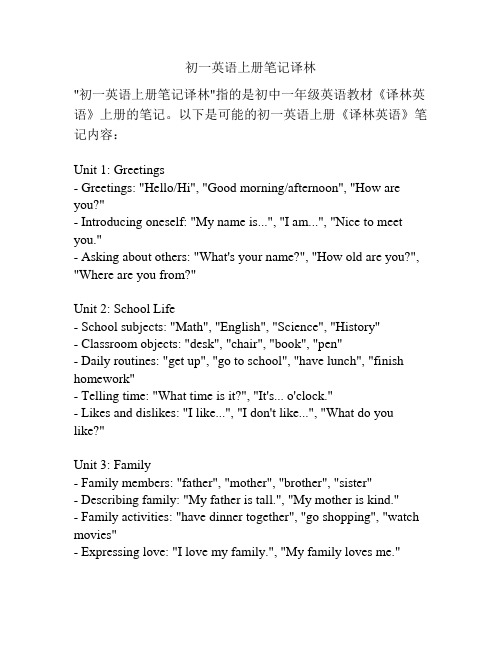
初一英语上册笔记译林"初一英语上册笔记译林"指的是初中一年级英语教材《译林英语》上册的笔记。
以下是可能的初一英语上册《译林英语》笔记内容:Unit 1: Greetings- Greetings: "Hello/Hi", "Good morning/afternoon", "How are you?"- Introducing oneself: "My name is...", "I am...", "Nice to meet you."- Asking about others: "What's your name?", "How old are you?", "Where are you from?"Unit 2: School Life- School subjects: "Math", "English", "Science", "History"- Classroom objects: "desk", "chair", "book", "pen"- Daily routines: "get up", "go to school", "have lunch", "finish homework"- Telling time: "What time is it?", "It's... o'clock."- Likes and dislikes: "I like...", "I don't like...", "What do you like?"Unit 3: Family- Family members: "father", "mother", "brother", "sister"- Describing family: "My father is tall.", "My mother is kind."- Family activities: "have dinner together", "go shopping", "watch movies"- Expressing love: "I love my family.", "My family loves me."Unit 4: Hobbies- Hobbies and interests: "reading", "drawing", "playing soccer", "listening to music"- Talking about hobbies: "I like reading books.", "What's your hobby?", "Do you like...?"- Asking for opinions: "What do you think of...?", "How about...?"Unit 5: Daily Life- Daily activities: "get dressed", "brush teeth", "go to bed", "wash face"- Weather: "sunny", "cloudy", "rainy", "snowy"- Clothes: "shirt", "pants", "shoes", "hat"- Expressing preferences: "I prefer...", "I would rather..."Unit 6: Food and Drinks- Food: "rice", "noodles", "chicken", "vegetables"- Drinks: "water", "juice", "milk", "tea"- Ordering food: "I would like...", "Can I have...", "What do you recommend?"- Likes and dislikes: "I like eating fruits.", "I don't like spicy food."以上是初一英语上册《译林英语》的一些可能的笔记内容。
- 1、下载文档前请自行甄别文档内容的完整性,平台不提供额外的编辑、内容补充、找答案等附加服务。
- 2、"仅部分预览"的文档,不可在线预览部分如存在完整性等问题,可反馈申请退款(可完整预览的文档不适用该条件!)。
- 3、如文档侵犯您的权益,请联系客服反馈,我们会尽快为您处理(人工客服工作时间:9:00-18:30)。
第一部分:词汇用法Unit 11 love/like/enjoy doing sthI like swimming .我喜欢游泳2 read this book 读这本书3 how to do sthHow to look after your e-dog.如何照顾你的电子狗4the first to do sthHe is the first to go to school.他第一个到校5nice to do sth /sbNice to meet you很高兴见到你。
Our teachers are nice to us我们的老师对我们友好6have/with short hairTom has short hair.汤姆留着短发The girl with short hair is my sister.留着短发的女孩是我的妹妹7be/come fromTom is from Shanghai./Tom comes from Shanghai.汤姆来自上海8be good at/do well in doing sthKitty is good at dancing./Kitty does well in dancing. Kitty擅长于跳舞9walk home/go home on footTim goes home on foot every day ./Tim walks home every day. Tim每天步行回家10everyoneEveryone is here .每个人都在这儿11 live with sb in spI live with my family in Nangjing.我和我的家人住在南京12wear glasses/coatMary wears glasses.Tom always wears a black coat汤姆总是穿着黑色的外套.13all/bothAll my classmates are nice .我的同学都友好My parents are both teachers.我的父母都是教师14 need to do sthWe need to do more exercise .我们需要多运动15spend time doing sth/on sthI spend half an hour reading every morning .我每天早晨花费半个小时读书Daniel spends two yuan on his pen.Unit21walk to =go to…on footTom walks to school every day./Tom goes to school on foot .汤姆步行去学校2many times a dayI read books many times a day .我每天读书好几次3sport/sportsWhat is your favourite sport?你最喜欢的运动是什么?Let`s play sports .我们一起运动吧4every day/every weekI go swimming every week.我每周去游泳5what/how aboutWhat about going swimming?去游泳怎么样?6like…very muchI like playing football very much.我非常喜欢踢足球7favourite=like…bestMy favourite volleyball player is Tom ./I like Tom best.汤姆是我最喜欢的足球运动员8look +adjKitty looks slim Kitty看上去苗条9play…very wellWe play badminton very well.我们打羽毛球非常好10 in his free timeIn his free time,he studies English.在他的业余时间,他学习英语11make sb do +adj/do sthIt makes him happy.它是他开心It makes me feel great.它使我感觉很棒12want to do sthLi Hua wants to play in the next world Cup.李华想踢进下一届世界杯13come trueI hope his dream comes true.我希望他的梦想变为现实14at / on the weekend/on/at weekendsMy mum often goes shopping at weekends我的妈妈经常在周末购物15shop/go shoppingI want to shop/go shopping this weekend.我想这个周末去购物16Reading is fun.Smoking is bad for you .吸烟对你有害17talk aboutWe often talk about playing basketball matches .我们经常谈论篮球比赛18 heroesThey are all my heroes. 他们都是我的偶像。
Unit31would like to doI would like to go swimming .我想去游泳2the parents` meetingWe have a parents` meeting every week.我们每周有一次家长会3show sb aroundI show you around my school.我带你参观我的学校3in front of…There are some trees in front of my classroom.我教室的前面有一些树4on the ground floorOn the ground floor, there is a big room.在一楼有一个大房间5in the white shirtThe man in the white shirt is my uncle 穿白色衬衫的那个人是我叔叔6on the phoneI often talk on the phone with my friends.我经常和我的朋友打电话聊天7say hello toWe should say hello to our friends .我们应该和我们的朋友问好8all kinds ofThere are all kinds of books in our school.我们学校有各种各样的书9borrow…fromI always borrow some books from my library.我总是从图书馆借一些书10a fewTom has a few comic books汤姆有一些漫画书11far away from…My home is far away from my school.我家离学校很远12 take a bus to..My sister often takes a bus to work.我姐姐经常乘公交车上班13 It takes sb some time to do sthIt takes me half an our to do homework every evening.我每晚花费半小时做家庭作业Unit 41. wake up 醒来,叫醒wake up sb./ wake sb. up 把某人叫醒(代词只能用wake sb. up , wake him up)It’s 7:00 a.m. now , please wake him up.2. It’s time for sth. 该做某事的时候It’s time for breakfast.3. go out 出去Let’s go out for a walk.4. how to have fun 如何玩得愉快“疑问句+动词不定式”结构How to look after your e-dog.What to do 做什么I don’t know what to do.Where to go 去哪里I don’t know where to go.have fun=have a good time = enjoy oneself 玩得高兴have fun doing sth. 做某事有趣We always have fun playing games.5. get up 起床Don’t get up too late .6. have breakfast / lunch / supper 吃早/午/晚饭7. have lessons 上课We usually have lessons in the morning.8. do after-school activities 进行课外活动When do you usually do after-school activities.9. be late for …迟到,迟的Don’t be late for class.10. do morning exercises 做早操We usually do morning exercises first.11. my favourite subject 我最喜欢的科目My favourite subject is English.12. be nice to sb. 对…友好They are all nice to me.13. chat with sb. 与某人聊天I like chatting with my friends.14. practice doing sth. 练习做某事Do you often practice playing basketball after school ?15. daily activities 日常活动daily life 日常生活16. play in the playground 在操场上玩They boys are playing in the playground.17. on Wednesday afternoon 在星期三下午on +具体的时间We have a basketball match on Wednesday afternoon.18. plant trees 植树Look ! They are planting trees in the garden.19. on Children’s Day 在儿童节on Sunday morning 在星期天的早晨on +具体某一天20. a member of the swimming team 游泳队的一名成员21. how often 多久How often do you visit a museum ?22. twice a month 一个月2次once a year 一年一次an hour a day 每天一小时23. go on a picnic with my family 和我的家人去野餐I often go on a picnic with my family at weekends .24. a girl in a skirt 一个穿裙子的女孩in +表示颜色的名词:“穿……颜色的衣服”a girl in red 一个穿红衣服的女孩25. clean the street 打扫街道26. at noon 在中午,在正午I often go home at noon27. ready for breakfast 准备吃早饭We are ready for breakfast.get ready for sth. 为…做准备Mum is getting ready for the dinner.28. too much 太多(的) too much homework eat too muchmuch too :太The picture is much too beautiful.Unit 51.have a guess 猜一猜Let’s have a guess.2.dress up as 装扮成dress sb./oneself 给某人/给自己穿衣服be dressed in 穿着Mom is dressing her child. The girl can’t dress herself.The boys dress up as ghosts.The girl is dressed in red.3.learn about sth. 学习关于….We learn about the world at school.4.around the world=all over the world全世界,世界各地5.Dragon Boat Festival 端午节Mid-autumn Festival 中秋节Thanksgiving Day 感恩节6.a list of festivals 一张节日的清单a list of sth. 一张…的清单 a shopping list 一张购物清单Sandy is writing a list of gifts.7.get together 聚会,联欢We like getting togethers on Sundays.8.enjoy the full moon 欣赏满月9.thank sb. for doing sth. 谢谢某人做某事thank sb. for sb. 因为某事而感谢某人Thank you for helping me. Thank you for your help10.make pumpkin lanterns . 制作南瓜灯笼11.knock on the door 敲门Knock on the window 敲窗户12.give sb. sth.=give sth. to sb. 给某人某物give us some candy =give some candy to usgive sb. sth. as a treat 用某物招待某人They will give us dumplings as a treat.13.play a trick on sb.=play tricks on sb. 抛弃某人Don’t play tricks on me.14.give sb. a treat =treat sb. 招待某人Miss Black always treats her guests well.=Miss Black always gives her guests a good treat.15.on the evening of …在…的晚上Let’s have a party on the evening of Friday.16.make lanterns out of oranges. 用橙子做灯笼make sth. out of …用…制成某物He can make kites out of paper 。
